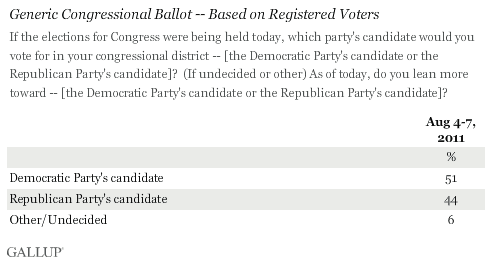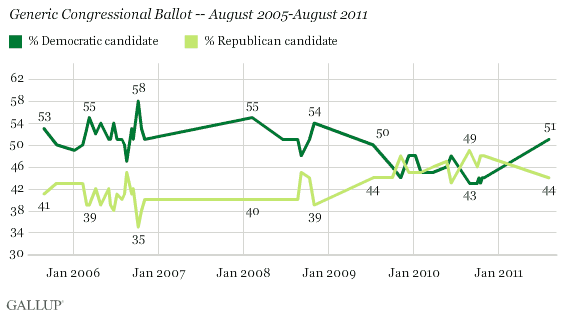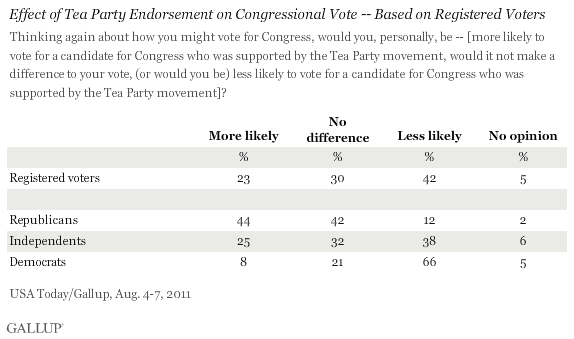PRINCETON, NJ -- Gallup's first measure of the 2012 congressional elections shows Democrats leading Republicans, 51% to 44%, in registered voters' preferences for which party's candidate they would support in their district "if the elections for Congress were being held today."

The poll was conducted Aug. 4-7, after Standard & Poor's downgrading of the U.S. government's credit rating last week but prior to this week's volatility in the stock market, including the 635-point stock market drop on Monday, Aug. 8.
The seven-percentage-point edge for Democratic congressional candidates, nationally, contrasts with ties or Republican leads in most Gallup polls leading up to the 2010 midterm elections. However, the Democratic advantage is not as large as those they enjoyed in the 2006 and 2008 congressional election cycles -- each of which produced a Democratic majority in Congress. The Democrats averaged a 10-point lead over Republicans among registered voters in the year prior to the 2008 elections and an 11-point advantage leading up to the 2006 elections, with individual polls showing them ahead by as much as 23 points.

Tea Party Endorsements Could Do More Harm Than Good
Gallup also asked registered voters how a Tea Party endorsement would affect their likelihood of voting for a congressional candidate. The effect is nearly 2-to-1 negative, with 42% saying they would be less likely to vote for such a candidate versus 23% saying they would be more likely. About a third say it would make no difference or are unsure.
Among registered voters, most Republicans say a Tea Party endorsement would either make them more likely to vote for a candidate (44%) or make no difference (42%), while most Democrats say it would make them less likely to vote for a candidate (66%). Independents' reactions are similar to the national average, with 25% more likely to vote for a candidate endorsed by the Tea Party and 38% less likely.

These results echo those of a separate question in the new survey showing that, by 20% to 14%, more Americans strongly oppose the Tea Party movement than strongly support it.
Bottom Line
The Democratic Party may be better positioned today to win seats in the 2012 congressional elections than it was leading up to the 2010 midterms that resulted in its loss of 63 House seats and majority control. However, the Democrats' advantage is currently not as strong as that seen in 2006, when they regained majority control from the Republicans, or in 2008, when they maintained it.
To re-establish a more favorable positioning with voters, the Republican Party will have to deal carefully with the national Tea Party movement. While most Republicans say Tea Party endorsements either make no difference to their vote or increase their likelihood of supporting a candidate, at this point the effect on the all-important independent vote is more negative than positive.
Survey Methods
Results for this USA Today/Gallup poll are based on telephone interviews conducted Aug. 4-7, 2011, with a random sample of 1,319 adults, aged 18 and older, living in all 50 U.S. states and the District of Columbia. The survey includes an oversample of 376 non-Hispanic blacks, consisting of 88 interviews done as part of the random national sample and 288 interviews with blacks who had previously participated in national Gallup Polls and agreed to be re-interviewed at a later date. The data from the national sample and re-interviews are combined and weighted to be demographically representative of the national adult population in the United States and to reflect the proper proportion of blacks in the overall population.
For results based on the total sample of national adults, one can say with 95% confidence that the maximum margin of sampling error is ±4 percentage points.
For results based on the sample of 1,204 registered voters, the maximum margin of sampling error is ±4 percentage poin
Interviews are conducted with respondents on landline telephones and cellular phones, with interviews conducted in Spanish for respondents who are primarily Spanish-speaking. Each sample includes a minimum quota of 400 cell phone respondents and 600 landline respondents per 1,000 national adults, with additional minimum quotas among landline respondents by region. Landline telephone numbers are chosen at random among listed telephone numbers. Cell phone numbers are selected using random-digit-dial methods. Landline respondents are chosen at random within each household on the basis of which member had the most recent birthday.
Samples are weighted by gender, age, race, Hispanic ethnicity, education, region, adults in the household, and phone status (cell phone only/landline only/both, cell phone mostly, and having an unlisted landline number). Demographic weighting targets are based on the March 2010 Current Population Survey figures for the aged 18 and older non-institutionalized population living in U.S. telephone households. All reported margins of sampling error include the computed design effects for weighting and sample design.
In addition to sampling error, question wording and practical difficulties in conducting surveys can introduce error or bias into the findings of public opinion polls.
View methodology, full question results, and trend data.
For more details on Gallup's polling methodology, visit www.gallup.com.
